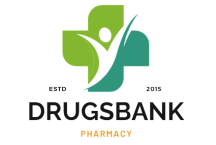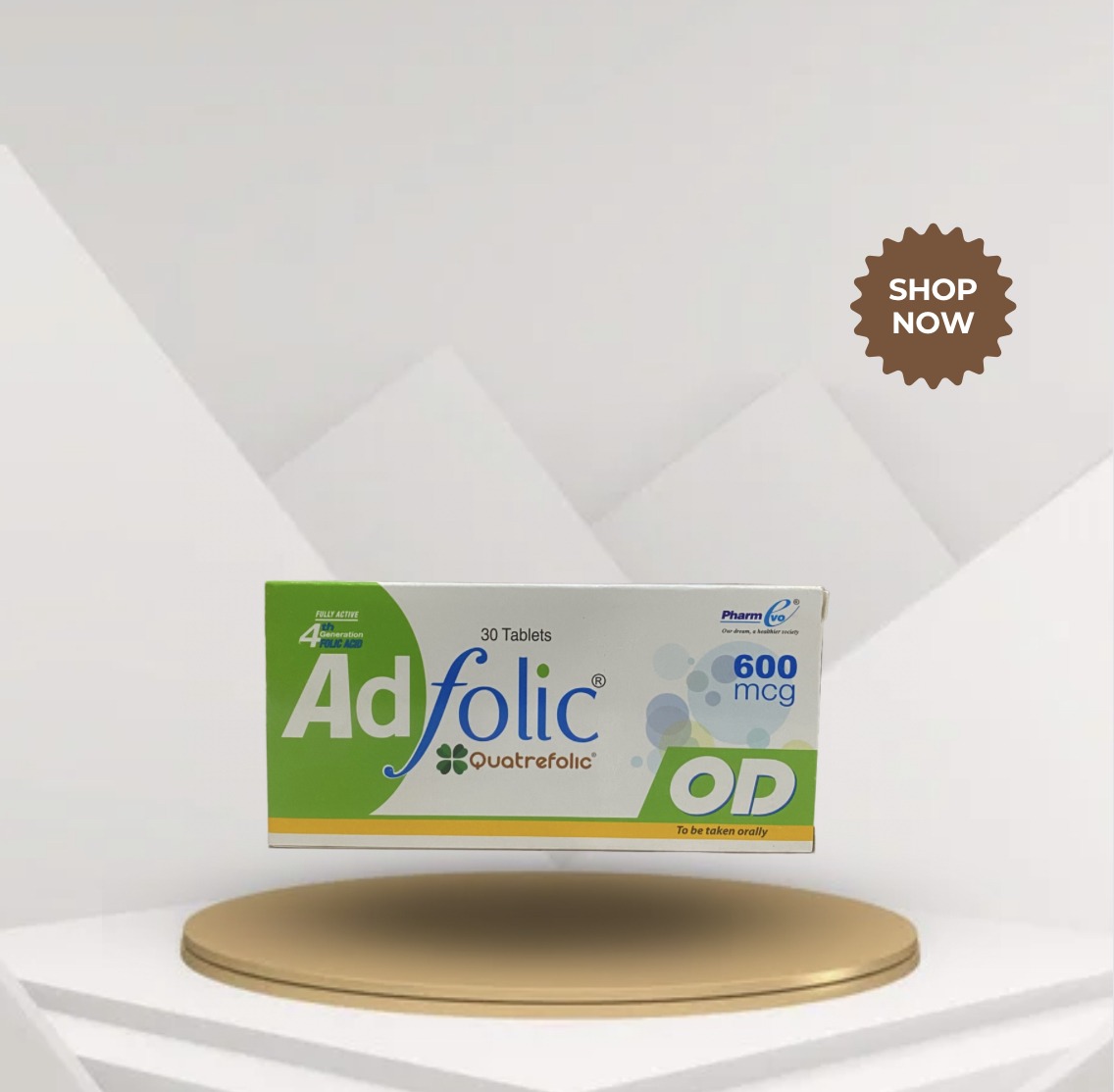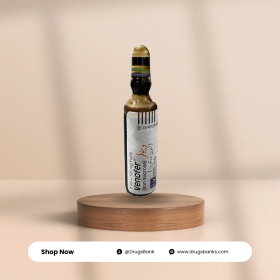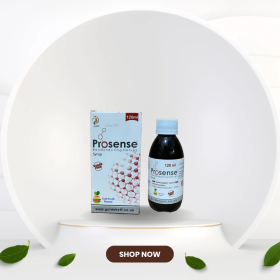In the vast landscape of pharmaceuticals, numerous drugs cater to a wide array of medical conditions. One such medication that has garnered recognition is Adfolic. Adfolic is a brand of folic acid manufactured by PharmEvo, with its primary active component being Quatrefolic. In this comprehensive article, we aim to provide you with a detailed overview of Adfolic tablet uses, its recommended dosage, potential side effects, contraindications, and much more.
What is an Adfolic Tablet?
Adfolic is a brand name for the B-vitamin group, commonly referred to as vitamin B9. Its significance lies in its involvement in various fundamental bodily functions, including the production of red blood cells, DNA synthesis, and cell division. Adfolic comes in two distinct variants:
- Adfolic 300 mg and
- Adfolic OD 600mg,
- Each serving specific purposes and indications.
Adfolic Tablet Uses
Pregnancy and Lactation
During pregnancy and lactation, folic acid becomes an essential nutrient. Quatrefolic, found in Adfolic, plays a pivotal role in preventing neural tube defects in infants and supporting the healthy development of the fetus.
Dietary Supplement for Adults and Older People
Adfolic serves as a dietary supplement for adults, especially older individuals who may encounter challenges in absorbing folate effectively.
Prevention of Spontaneous Abortions
Occasionally, recurrent spontaneous abortions may occur due to folate deficiency. Adfolic can be employed to address this deficiency and reduce the risk of miscarriages.
Hyperhomocysteinemia
Elevated levels of homocysteine in the blood, known as hyperhomocysteinemia, can lead to various health issues. Adfolic is instrumental in managing this condition.
Folate Deficiency Caused by Medications
Certain medications, such as phenytoin, phenobarbital, and primidone, can lead to folate deficiency. Adfolic can be prescribed to counteract this deficiency.
Folate Deficiency Caused by Health Conditions
Long-term damage to red blood cells or kidney dialysis can result in folate deficiency. Adfolic is used to address this deficiency in such cases.
Neurological Conditions
Some research suggests that folic acid supplementation might benefit conditions like depression, cognitive impairment, dementia, and Alzheimer’s. However, it is important to consult a healthcare professional before using Adfolic for these purposes.
Adfolic Tablet Dosage and Administration
The recommended dosage of Adfolic is similar to that of regular folic acid, based on the “Recommended Dietary Allowances for Folate in Children and Adults.” The dosage may vary depending on the specific condition being treated and individual health factors.
For pregnant women, a daily dose of 600 mcg of folic acid is commonly prescribed to prevent neural tube defects in the baby. For other indications, healthcare professionals may adjust the dosage accordingly.
Adfolic Tablet Side Effects
Like any medication, Adfolic may cause side effects in some individuals. Common side effects of folic acid supplementation include:
- Loss of appetite (Anorexia)
- Nausea
- Abdominal pain
- Flatulence (Gas)
- Allergic Reactions (rash, pruritus, urticaria, dyspnea, anaphylactic reactions, including shock)
It is crucial to be aware of these potential side effects (adverse events) and seek medical attention if any adverse reactions occur.
Contraindications
Certain conditions and scenarios warrant caution or avoidance when using Adfolic:
- Long-term folate therapy is contraindicated in individuals with untreated cobalamin deficiency, such as pernicious anemia or other causes of cobalamin deficiency, including lifelong vegetarians. An absorption test for cobalamin should be performed before starting long-term folate therapy, especially in elderly patients.
- Folic acid should not be administered alone in treating Addisonian, pernicious anemia, or other vitamin B12 deficiency states, as it may trigger sub-acute combined spinal cord degeneration.
- Folic acid should be used with caution in patients with folate-dependent tumors.
- Individuals with seizure disorders should be cautious with folic acid supplementation, especially in high doses, as it might worsen seizures.
Adfolic OD 600mg Tablet Uses
Drug Interactions
Adfolic may interact with other medications, affecting their effectiveness. Some notable drug interactions include:
- Fosphenytoin: Adfolic might decrease the effectiveness of fosphenytoin in preventing seizures.
- Methotrexate: Adfolic might decrease the effectiveness of methotrexate.
- Phenobarbital and Phenytoin: Adfolic can decrease the effectiveness of these drugs in preventing seizures and increase the risk of seizures.
- Primidone: Adfolic might reduce the efficacy of primidone in preventing seizures.
- Pyrimethamine: Adfolic might decrease the effectiveness of pyrimethamine in treating parasite infections.
- Sulfasalazine: Sulfasalazine can reduce the absorption of folic acid.
Use in Special Populations
Pregnancy
Folic acid is considered safe during pregnancy when taken appropriately. A daily dose of 600 mcg is commonly recommended to prevent congenital disabilities and neural tube defects in babies.
Nursing Mothers
Folic acid is excreted into human milk, but no adverse effects have been associated with its use during lactation.
Mechanism of Action of Quatrefolic
The mechanism of action of Quatrefolic, the active component of Adfolic, is related to its 5-methyltetrahydrofolate content. This derivative of tetrahydrofolic acid plays a crucial role as a coenzyme in various metabolic reactions, including the biosynthesis of nucleotide purines and pyrimidines, as well as the metabolism of critical amino acids. Quatrefolic aids in converting homocysteine to methionine when combined with vitamin B12, preventing potential pathologies and diseases associated with its deficiency.
Conclusion
Adfolic tablets, containing Quatrefolic as the main active component, are valuable supplements for various health conditions. From preventing neural tube defects in pregnant women to managing hyperhomocysteinemia, Adfolic is essential in promoting overall health. However, as with any medication, it is crucial to use Adfolic under the guidance of a healthcare professional to ensure safe and effective results.
FAQs (Frequently Asked Questions)
Question: Can Adfolic be taken without a doctor’s prescription?
-
- Adfolic should ideally be taken under a doctor’s guidance, especially during pregnancy or if you have specific health conditions.
Question: Are there any dietary restrictions while taking Adfolic?
-
- There are generally no dietary restrictions associated with Adfolic. However, maintaining a balanced diet is beneficial for overall health.
Question: Is Adfolic safe for children?
-
- Adfolic dosage for children should be determined by a healthcare professional. It is commonly used in pediatric care for specific medical conditions.
Question: Can Adfolic be taken alongside other medications?
-
- It is essential to inform your healthcare provider about all the medications you are taking to check for potential interactions with Adfolic.
Question: Are there any natural food sources of folate?
-
-
- Yes, several foods like leafy greens, citrus fruits, and legumes are rich in folate. However, supplements like Adfolic may be necessary in some cases to meet specific requirements.
-






Reviews
There are no reviews yet.